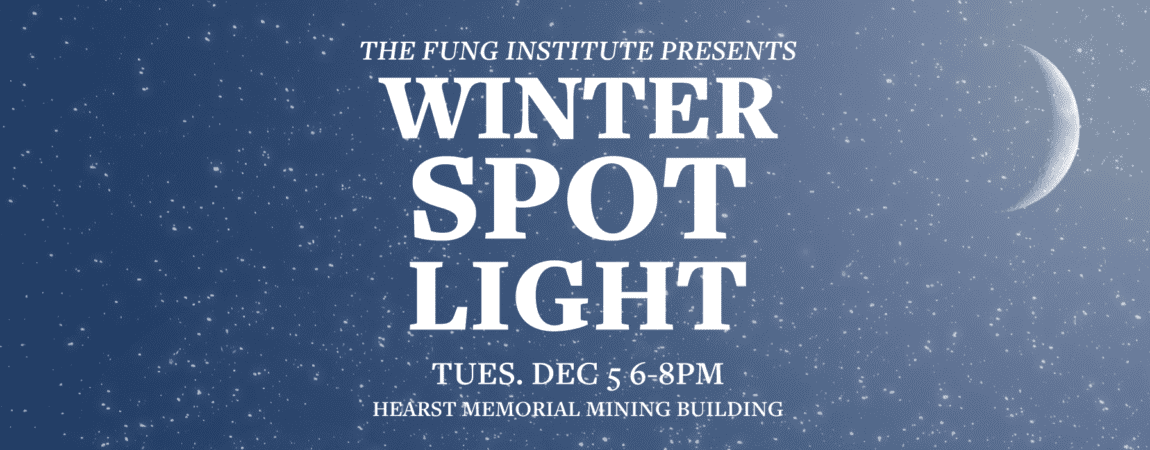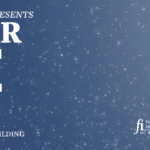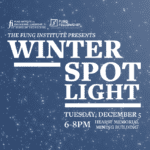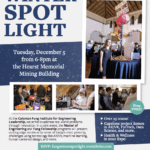Partner Toolkit
Thank you so much for your support in spreading the word about the Fung Institute’s Winter Spotlight!
Here are directions on how to best share this event with your community:
- RSVP and invite your friends with our Eventbrite RSVP page and Facebook event.
- Include us in your upcoming newsletter or on your website. Here is the sample text to copy and paste:
Join us at the Fung Institute Winter Spotlight!
At the Fung Institute, we strive to address real world problems through innovation. Come celebrate with us on Tuesday, December 5, 2017 from 6-8pm as Master of Engineering candidates and Fung Fellow undergraduates highlight their capstone projects. Discover cutting edge solutions to some of today’s most pressing challenges using AR/VR, machine learning, human-centered design, and more. Mix and mingle with the trailblazers of the future over a festive fare.
Date/Time: Tuesday, December 5 from 6-8pm
Location: Hearst Memorial Mining Building Lobby
Images:
Click to enlarge
Winter Spotlight Hashtags:
- #FungSpotlight
- #MEngSpotlight
- #FungFellowSpotlight
Additional sample language for:
Twitter:
- Interested in cutting edge solutions to some of today’s most pressing challenges using technology like AR/VR, machine learning, human-centered design, etc? RSVP: bit.ly/FungSpotlight #FungSpotlight
- Join us for our #FungSpotlight to discover Berkeley MEng student innovations at the forefront of solving real world problems. RSVP: bit.ly/FungSpotlight!
- Join us for our #FungSpotlight to discover how the Fung Fellows are working at the forefront health and wellness innovations. RSVP: bit.ly/FungSpotlight!
- Explore the innovative tech solutions that 25+ teams with project demos in AR/VR, FinTech, Data Science, etc. have to offer by attending our #FungSpotlight event! RSVP: bit.ly/FungSpotlight
Facebook:
- Don’t miss out on the #FungSpotlight, where you can learn about student solutions to some of today’s most pressing challenges using technology. Register at bit.ly/FungSpotlight
- Join the Fung Institute on December 5th at @UCBerkeley from 6-8pm to view over 25 teams and project demos in AR/VR, FinTech, Data Science, and more to see how our students aim to solve today’s most urgent challenges through technology. Make sure to register for the #FungSpotlight event at bit.ly/FungSpotlight
- Calling all innovators, visionaries, and techies! Make sure to register for the #FungSpotlight at bit.ly/FungSpotlight to see the latest in tech innovation that focuses on solving real world problems.
Fung Institute Teams
Our Design-by-Morphing project goal is to accelerate the shape optimization process for the design industry by using Artificial Neural Networks. The Neural Network optimizes your performance function, based on any criteria YOU set, by repurposing your past designs into a new morphed version of them.
Team members: Nelly Alandou, Robert Hu, Caroline Jeria, Maitreya Patel, Darshan Mehta
Faculty advisor: Philip Marcus
Arris’ technology is aimed to transform the carbon fiber manufacturing process. Generally speaking, this technology changes the existing, highly labor and resource intensive manufacturing process for carbon fiber composites through process optimization and automation for high-volume production so that the cost of manufacturing parts from carbon fibers becomes lower.
Team members: Wonjun Yim, Shishir Sirohi, Ryan Locke, Scott Perkins, Rijul Mediratta
Faculty advisor: Marc Asta
Our project aims to solve the problem of machine learning algorithms not being able to correctly identify and track pedestrians.
Team members: Mubarak Abdul Kader, Salma Benslimane, Moyu Li, Dan Xu, Dayi Wang
Faculty advisor: Gabriel Gomes
We are trying to provide a solution for viewing remote scenery by using virtual reality technology. We control a drone carrying a 360 camera to fly to some places, capture 360 videos and transmit them back to a theatre in real time where some audiences sit and view these videos with vr devices.
Team members: Yidong Huang, Rongbing Zhou, Diyu Luo
Faculty members: Allen Yang
ChampionHip is developing an innovative hip replacement method that will improve functionality, implant longevity, and quality of life in young patients. Our implant will be derived from biological donor tissue to maintain natural joint properties, allowing the patients to resume active lifestyles.
Team members: Karl Engel, Stephen Muller, Alejandra Pacheco, Vija Veinbergs
Faculty advisor: Dr. Grace O’Connell
We are working with UCSF to develop a classification model that will reduce false positive Premature Ventricular Contraction alarms. This model will be integrated into a “super alarm” patient monitoring tool.
Team members: Alexandra Ackroyd, Adam Andrews, Sergev Malool, Siddhant Issar, Umesh Thillaivasan, Yuntao Wang
Faculty advisors: Gabriel Gomes, Xiao Hu
The first goal of our Capstone is to use machine learning to predict the right steering angle of a vehicle, given a caption of the road. The second goal is to detect the lanes painted on the road, and identify different types of lanes.
Team members: Xianpeng Wang, Francis Yang, Lou Graniou, Richard Man, Ahsen Safeer
Faculty advisor: Anil Aswani
For our Capstone, we are working with the U.S. Department of State to create solutions for the prevention of pandemic outbreaks of mosquito-borne diseases like Zika, Dengue and Chikungunya that kill 1 million people every year. Through intensive customer discovery, we are creating a community-based solution that will empower the at-risk population, mainly those living close to or maintaining standing-water bodies nearby which act as mosquito breeding sites, with the right tools for a long-term solution to this problem. We are starting to work with an NGO in Panama as a pilot to test our minimum viable product (MVP)and secure the environment of 10,000 people as a positive side-effect.
Team members: Jasodhara Raj, Laila Zouaki
Faculty advisor: Dr. Amy E. Herr
The Digital Arts Engagement Platform aims to transform the way in which UC Berkeley students engage with and experience arts in the Bay Area. The Fung Institute of Engineering digital arts team is creating a novel art technology in the form of an IoT wearable device and a complementary online game that will invent digital engagement experiences to stimulate public attention and participation in art activities such as attending a theater performance, visiting an art gallery, going to a museum, attending a film lecture or poetry reading, or attending an “underground” student culture event.
Team members: Luna Izpisua Rodriguez, Kyra Chang, Alexandre Vincent, Jiahe Zhou, Yuyang Pan
Faculty advisor: Wayne Delker
As the automotive industry makes strides towards connected and automated vehicles (CAV), it is developing new technologies that can operate vehicles without driver input. This project is focused on quantifying the amount of energy that these technologies can save by operating vehicles more efficiently and effectively than human drivers.
Team members: Paaras Agrawal, Karl Schmidt, Sarah Leong, Sai Kannan Sampath, Devina Jain, Jia Xi Tay
Faculty advisors: Wayne Delker, Chris McCoy
We will design and implement a software program to automatically explain mathematical notations in scientific papers. When the user opens a scientific paper, this user interface will identity the mathematical notations in the paper, and show the appropriate explanations for each notation.
Team members: Yujia Wang, Lysia Li, Tianhao Zhou
Faculty advisors: Marti Hearst, Andrew Head
The goal of our project is to develop low-cost technologies to convert the ubiquitous temperature gradients into non-intermittent electricity for autonomous powering of IoT devices. The novelty and uniqueness of the approach lie in the non-intermittency of the power source, as well as the operational reliability of the devices, since no moving parts are involved.
Team members: Peilin Liu, Yuting Liu, Xinru Shen, Joon Woo Kim
Faculty advisor: Junqiao Wu
Our capstone team is tasked with identifying what the future mobility needs will be as autonomous vehicles and electric vehicles hit the market, and then prototyping solutions that address these needs. Throughout the need finding and prototyping process, our team is placing a special emphasis on identifying a true, unique need in the mobility space, and practicing human-centered design when developing our solutions.
Team members: Stephanie Cantu, Satish Kanagaraj, Etienne Marecal
Faculty advisor: Alice Agogino
The objective of this project is to develop a Wireless Sensor Network (WSN) system in crop farms to improve its production and reduce operation cost. The system will collect and send real-time data of the soil and crops to the farmers and experts, who will then take actions according to the data analysis to more efficiently manage the operation and production of the farm.”The objective of this project is to develop a Wireless Sensor Network (WSN) system in crop farms to improve its production and reduce operation cost. The system will collect and send real-time data of the soil and crops to the farmers and experts, who will then take actions according to the data analysis to more efficiently manage the operation and production of the farm.
Team members: Haipeng Yu, Qichang Hu, Kun Yang
Faculty advisor: George Anwar
This project is making modular, affordable, and user-friendly prosthetic hand to assist children in specific activities. We aim to make a passive prosthetic hand for playing on monkey bar by the end of Fall semester.
Team members: Aashish Bhardwaj, Aastha Shah, Annie Lee, Jacqueline Nguyen, Jose Ramirez
Faculty advisors: Prof. Grace O’Connell and Prof. Alice Agogino
To create 3D printer materials that have properties that are determinable by the customer. The process should be cost efficient and maintain the integrity of the material , as well as, be easy to produce.
Team members: Jiayun Shao; Xiao Liu; Apoorva Sooranahalli; Johann Chow; Pratik Reddy, Tsung Ying Tsai
Faculty advisor: T. I. Zohdi
We are designing and implementing a self-driving E-bike prototype. The design will enable bicycles to autonomously redistribute themselves for more efficient bike-sharing program.
Team members: Min Kim, Robert Ou, Ivan Xia
Faculty advisor: Seth Sanders
We are working on using machine learning to predict occurrence of psoriatic arthritis from the psoriasis patients based on EMR and Genotype data. It’s an awesome project cause: 1. It’s hard to gather this huge data set with useful information but we have it! 2. Not much attention has been paid on the PsA prediction and we are doing it right now!
Team members: Ahmed Issaoui, Adrian Lemaigre Lopez , Pierrehabte Nouvellon, Yan Zeng
Faculty advisor: Professor Anil Aswani
We are implementing the human-centered design approach and working with wind, wildlife, engineering design, renewable energy, and environmental experts to modify and site wind turbines in Marin County to be less harmful to wildlife, quieter, and more visually acceptable in the natural landscape. With the demand for local renewable energy generation ever increasing, we have an enormous opportunity to demonstrate the feasibility of small-scale wind power generation for Marin, cities along the California coast, and ultimately, developing coastal communities located around the world.
Team members: Austin Campbell, Chahal Neema, Erica McClinton, Ali Elashri
Faculty advisors: Alice Agogino, Philip Marcus
Fung Fellowship Teams
Developing novel methods to leverage AR/VR to reduce anxiety for young children who have cancer. Baloo is partnering with the Center for New Media and the Graduate School of Journalism at UC Berkeley.
Team members: TeJae Dunnivant, Crystal Rubalcava, Vicky Zamarripa
Customer group: Kids (prenatal to teen)
BrainWalk is working to improve the classic “Neuro Test” that physicians use to detect the onset of neurodegenerative disorders by integrating state-of-the-art technology, including virtual reality, eye tracking, voice recognition, body motion tracking, and machine learning algorithms, into the clinic. The end product will be a toolkit that can be used by nurses and generalists at non-neurology clinics to detect early signs of these disorders.
Team members: Joshua Price, Apollo Jain, Alankrita Dayal, Megha Majumder
Customer group: Older Adults
BreakTime! aims to study the effects of Goji Play VR fitness technology on student behavior, motivation, and academic ability. Through working directly with schools, we aim to co-create a successful, yet economical model academic institutions to run similar active game break programs.
Team members: Miguel Flores, Anna Cardenas, Julia Chow, Marycon Jiro, Markayla Stroubakis
Customer group: Kids (prenatal to teen)
Cuddle Club incorporates technology and mild game play into the bedtime process to help parents teach their children to develop healthy habits. A stuffed bear is embedded with a sleep trainer/tracker to gather valuable health information.
Team Members: Jeremy Hammer, Angela Lee, Troy Woodall, Donovan Blount
Customer Group: Kids (prenatal to teen)
We plan on working with OLLI@Berkeley to design a product for older adults that will help improve their gait, while stimulating cognition and providing feedback!
Team members: Michelle Sou, Lydia Chen, Tanisha Randwall, Anna Bloom
Customer group: Older Adults
Peerlocity seeks to use Bitmark’s blockchain technology to create secure and decentralized data exchanges regarding transportation data. Insight and access of such data provides potential for not only a smart and connected traveler but also a smart and connected city.
Team members: Léa Tran-Le, Luyi Huang, Mahek Modi, Ian Erickson, Omar Mohamed
Customer group: All ages
ReRoot Wellness aims to create an integrative program that trains Native Womxn in 3-D printing to tell their story of traditions and cultural values. The goal of this project is to bring awareness to non-Natives about the health and wellness challenges and ways to acknowledge and be allies/accomplices to Indigenous communities.
Team members: Betsy Rosales Avalos, Jose Ramos Mora, Josie Ygnatowiz
Customer group: All ages
Soteria Health aims to better inform individuals about the importance of their health data and how they can be empowered through more transparent ownership such data. Additionally, Soteria aims to explore how to incentivize people to participate in an ecosystem where they can transfer personal health data to other institutions.
Team members: Hamilton Chang, Alejandra Leynez-Chantres, Yana Gong
Customer group: Older Adults
A pilot project exploring whether Goji Play would be effective as an incentive or motivational tool to help elementary aged students from under-served communities with ADHD or other behavioral issues to improve their focus/attention for school and homework.
Team members: Nick Kao, Katie Decker, Jessica Yescas, Brian Kropf, Diane Nguyen
Customer group: Kids (prenatal to teen)






